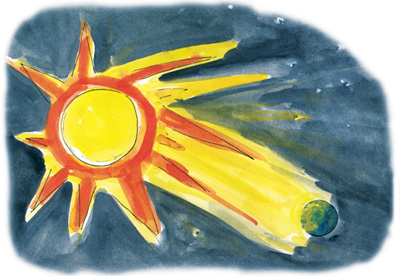Have you ever wondered why we celebrate Halloween on October 31 rather than on some other date? Doesn’t it seem strange that Groundhog Day falls on February 2, to celebrate spring, when groundhogs are still in the middle of winter’s hibernation? Why is Christmas celebrated on December 25; why is Easter called Easter? None of this can be explained by our modern calendar, but it makes perfect sense when we look at the natural cycle of the seasons and the seasonal celebrations of older cultures.

Many of our modern holidays come from very ancient calendars that people brought to North America from their homelands in northern Europe and the British Isles. Though our style of celebration has changed over the centuries, these ancient festivals are reminders of how our northern European ancestors (like our ancestors from all over the world) once lived by the rising and setting of the moon, sun, stars, and planets.
Long before the time of Julius Caesar (and during his time as well) there were large groups of wandering people north of Rome, who measured time by their own calendar. Unlike the Roman calendar, which only measured the sun’s passage across the sky, their calendar paid attention to the waxing and waning of the moon and to the positions of the stars as well. Because they were a farming civilization, the changing of the seasons was important to them, too, and their celebrations marked things like the birth of lambs and the harvesting of grain.
Who were these people? And how did their seasonal festivals change to become the holidays we celebrate today? To the Romans they were called the Galli or Gauls, to the Greeks they were the keltoi—the “hidden people”—as they had no written language, their stories were “hidden” from other cultures.
They kept their traditions alive for centuries by telling stories and reciting poetry out loud. It would be impossible to write their stories down and still have them contain all the levels of meaning that a live storyteller could bring to them. It is from these stories, from artifacts found in ancient gravesites, and from accounts by Greek and Roman writers that we have learned about these fascinating but little-known people. Today, these northern European people are known collectively as the Celts (pronounced kelts). We think that the word kilt comes from the same Greek root, meaning “to hide” or “to conceal.” Variations on their language can still be heard today in Gaelic (Scottish or Irish), Manx (on the Isle of Man), Welsh (in Wales), Cornish (in Cornwall, England), and Breton (in Brittany, France).

Since the creation of life on our planet, all living creatures have been affected by the Earth’s spinning passage around the sun. The sun gives us our hours of light and dark, our days of rain and drought, our weeks of heat and cold, our seasons of growth and rest.
